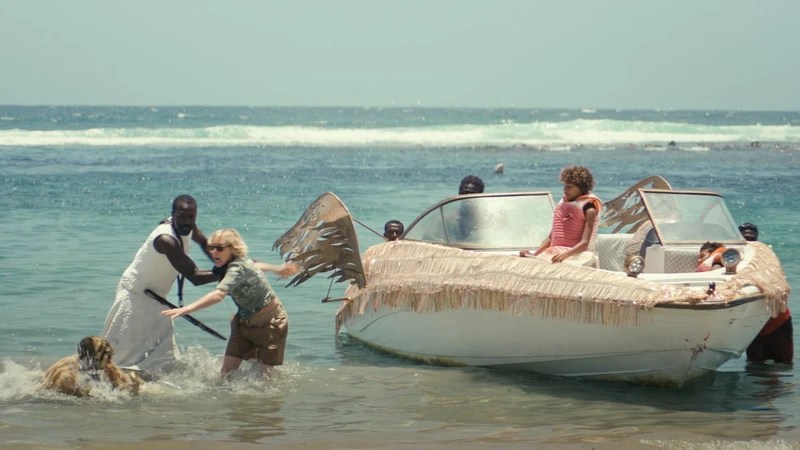
‘Gavagai’ Viennale Review: Cinema, Colonialism, and the Uneasy Politics of Representation
A German actress and a French-Senegalese actor reunite at a film festival after shooting a chaotic adaptation of Medea in Africa, only to confront the racial and cultural tensions lurking beneath the world of European art cinema.
It’s not unusual, especially at film festivals, to come across situations that resemble the ones Ulrich Köhler explores in Gavagai. In fact, one might even suspect the German filmmaker drew some inspiration from his own Sleeping Sickness (2011), also shot in Africa. Whether that’s the case or not, his new film recounts the experience—both during production and later at a German film festival clearly modeled after the Berlinale, though never named—of two actors, a German woman and a French-Senegalese man, who starred together in the film and are now presenting it at the event.
The story begins amid the chaotic shoot of an unusual adaptation of Medea, directed by French filmmaker Caroline Lescot (Nathalie Richard) in Senegal. Lescot—an intense, jittery presence clearly modeled after Claire Denis, both in temperament and look—argues with everyone around her, especially with her lead actress, Maja Tervooren (Maren Eggert). Maja, playing Medea herself, clashes constantly with the director in a passive-aggressive atmosphere that simmers with tension.
The third key figure is Nourou Cissokho (Jean-Christophe Folly), a Franco-Senegalese actor cast as Jason—Medea’s husband in the tragic Greek tale—who tries to keep the peace. It soon becomes clear he’s attracted to Maja, who’s going through a painful divorce. After a heated argument about the film’s ending—altered for reasons that seem questionable—the action shifts to Berlin, where Nourou has arrived to attend the festival. From the moment he checks in at the hotel, he experiences (not so) subtle racism from the security staff. Maja intervenes to help, even though Nourou insists it isn’t necessary.

From there, Gavagai focuses on the relationship between the two actors, the tense festival premiere, and a series of unsettling experiences Nourou has in Berlin. Within the festival context, he’s a celebrated guest; outside its red carpet perimeter, he’s treated like any other immigrant. These contrasts—interwoven with excerpts from the Senegal-set Medea—form the heart of a film that takes an intelligent, uncomfortable look at European filmmakers shooting in the Global South, cultural appropriation, colonial legacies, and the peculiar role film festivals play in sustaining these dynamics.
Nourou experiences these contradictions firsthand—the hotel incident escalates—while Caroline, the French director, refuses to acknowledge any critique of her Eurocentric gaze in a film shot in the middle of Africa. Maja, caught in between, struggles with her own turmoil and tries to help Nourou, though her good intentions end up backfiring in ways not unlike Caroline’s actions on set. With his trademark ambiguity and psychological precision, the director of In My Room crafts an unsettling reflection on the blurry boundaries between art, reality, and the illusions we hold about the world.
The film’s only real flaw is that it spends too much time on the fictional Medea footage, which turns out to be rather absurd—if not outright ridiculous film. A slightly less over-the-top “film within the film” might have made Köhler’s critique of cultural colonialism even sharper. Ironically, this absurd Medea earns rave reviews at the festival, despite being a bizarre hybrid of Pasolini and Black Panther—a kind of modernist-classicist mishmash that’s both fascinating and laughable.
If one can endure those intentionally bad scenes, Gavagai becomes a rich study of ambiguity—the charged relationship between Maja and Nourou, laced with desire and cultural tension; Nourou’s alienated wanderings through Berlin; and the strange logic of film festivals, especially when they invite “local voices” from the Global South without understanding what that experience really means. In Nourou’s case—an educated, cosmopolitan actor who’s more French than Senegalese—the irony is even deeper: many treat him like an undocumented migrant when he’s anything but. In this clash of assumptions and blind spots, Köhler delivers a sharp, unsettling, and deeply perceptive film.



